

Co-Principal Investigator and Mission Coordinator, NOAA Office of National Marine Sanctuaries - Maritime Heritage Program
Brad Barr received a B.S. from the University of Maine, a M.S. from the University of Massachusetts, and Ph.D. at the University of Alaska. He is currently a Senior Advisor in the NOAA Office of National Marine Sanctuaries’ Maritmie Heritage Program; Affiliate Professor at the School of Marine Sciences and Ocean Engineering at the University of New Hampshire; and Visiting Professor at the University Center of the Westfjords in Isafjordur, Iceland, and the World Maritime University in Malmö, Sweden. He has published widely on whaling heritage, marine mammal conservation and management, maritime cultural landscapes, ocean wilderness, preservation of natural and cultural resources of the Arctic, and place-based conservation and management of the marine environment.
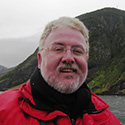
Co-Principal Investigator, Director, NOAA Office of National Marine Sanctuaries - Maritime Heritage Program
James P. "Jim" Delgado is a maritime archaeologist with four decades of experience in the field. His work has taken him around the globe, and includes work in the Arctic and Subarctic on wrecks of the 19th and 20th centuries. Author of more than 35 books, he has written on Arctic exploration and shipwrecks, including the bestseller, Across the Top of the World: The Quest for the Northwest Passage, in 2000. Dr. Delgado is currently the Director of the Maritime Heritage Program in NOAA's Office of National Marine Sanctuaries.
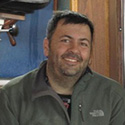
Captain
Captain Mike has been operating vessels in the capacity of captain since 1995 and has over 25 years’ experience in the maritime industry. He spent his first 17 years in the industry commercial fishing, where he found his calling at sea. He quickly worked up the ranks to captain, gaining experience from Norton Sound in the Bering Sea to Southern California.
After obtaining his U.S. Coast Guard Master's license, formal maritime training at the Pacific Maritime Institute and Clatsop College, Mike spent many years as Senior Captain for Cruise West, where he ran expedition cruise ships in Southeast Alaska, British Columbia, Washington, and the Sea of Cortez, Mexico. His career in the fishing industry, combined with many years running passenger vessels, has given Mike a diverse skill set and knowledge. This includes a strong mechanical background, with extensive experience in vessel maintenance and repair and an understanding of all operational systems aboard a vessel. Mike has a passion for travel and exploration which has led him to many corners of the world. Living in Alaska, he spends most of his winters exploring wild Alaska by snowmachine. This sense of adventure has brought him to the Arctic, where he now spends his summers in the Beaufort and Chukchi Seas.
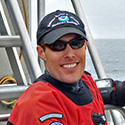
Maritime Archaeologist, NOAA Office of National Marine Sanctuaries - Maritime Heritage Program
Matthew Lawrence is a maritime archaeologist working for the Office of National Marine Sanctuaries at Stellwagen Bank National Marine Sanctuary headquartered in Scituate, Massachusetts. Growing up, he first experienced archaeological fieldwork through the Archaeology Club at Denver’s Museum of Natural History. After learning to SCUBA dive at 13, he chose the University of Miami in Coral Gables, Florida, as one of the few universities offering undergraduate opportunities in underwater archaeology. While there, Matthew had the opportunity to participate in three seasons of excavating Middle Archaic layers at Little Salt Spring on Florida’s west coast. After graduating cum laude with a B.A. in Marine Affairs, Matthew enrolled in East Carolina University’s Program in Maritime Studies. His fieldwork in North Carolina, Bermuda, California, and Washington focused on shipwreck site documentation and remote sensing survey. Following the culmination of his thesis research on historical and archaeological aspects of North Carolina steam navigation, Matthew began working for the Stellwagen Bank sanctuary. He has since directed numerous remote sensing and archaeological diving projects that have located and/or documented 50 shipwrecks on the sanctuary’s seafloor. Six of these sites are now listed on the National Register of Historic Places. He has also assisted the American Samoa, Thunder Bay, and Florida Keys sanctuaries with their archaeological inventories.
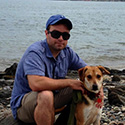
Edge Tech, Inc.
Evan Martzial, a New England native and lifelong ocean enthusiast, is the Product Line Sales Engineer for EdgeTech – the leader in high-resolution sonar imaging systems and underwater technology. With a degree in GIS and Cartography, Evan began his career at a recreation marine navigation company as Survey Manager, clocking many hours in the field and on the water. Most recently Evan held the role of Product Specialist for a hydrographic data acquisition, navigation and processing software company, prior to transitioning to the hardware side of the underwater imaging industry. With his wide scope of knowledge in both software and hardware and his hands on approach to his work, Evan brings great value and enthusiasm to all projects. His passion for travel, especially marine excursions, lends well to Evan’s professional successes. When he is not traveling, Evan calls Portland, Maine home, where he resides with his wife and puppy.
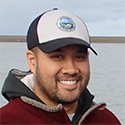
Hypack, Inc.
Vitad Pradith recently joined HYPACK, Inc., one of the most successful providers of hydrographic and navigation software worldwide. He works, alongside other Support Team members, to provide customers with customer support, onsite training and assistance with system integration. Vitad worked as a Physical Scientist at NOAA Office of Coast Survey for the past 11.5 years. His primary role was to provide technical direction and support to the Coast Survey Navigation Response Teams who are agile teams of hydrographers performing nautical chart updates and function as emergency responders during national incidents in the maritime domain. Vitad was also involved with several maritime archaeology cruises as the chief mapping scientist, transitioned research and development projects into proof of concept and field operations, and advised contracting officers on technical procurements. He has led many initiatives such as sensor and technology evaluations related to hydrography and emergency response applications and hydrographic data processing improvements using high performance computing systems.
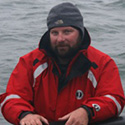
Relief Captain
Because of the pace of work and the many tasks for which Arthur was responsible onboard (and perhaps because he was too humble a man to toot his own horn), I did not receive a biography from Arthur, and take this opportunity to provide my personal observations about Arthur based on the I spent with him on the Ukpik. — Brad Barr, Chief Scientist
Arthur is a successful hunting and fishing guide in Alaska, is a valued employee of an equipment leasing firm in Prudhoe Bay when he is not serving as captain of the R/V UKPIK, and has a deep respect and appreciation for the natural resources of this Last Frontier. Arthur is drawn back to the waters of Alaska at every opportunity, but is equally at home in the vast wilderness of interior Alaska. He is an excellent and skilled vessel captain, a pretty good chef (with exceptional butchering skills, as we found when we fortuitously acquired the fresh caribou), something of a storyteller (with many stories to tell), and possesses the broad knowledge needed to successfully resolve the many challenges confronted on a research vessel working in this remote and unpredictable place. He is a quiet, deep-thinking man, steady and reliable, clearly values family and friends, and an amiable companion. He is a bear of a man, the sort of person many people from the “lower 48” think of when they envisage someone who guides in the wilderness of Alaska. It was a pleasure working with Arthur, and a privilege to get to know him a bit during the cruise.
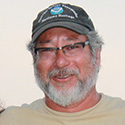
Maritime Archaeologist, NOAA Office of National Marine Sanctuaries - Maritime Heritage Program
Hans Van Tilburg was originally introduced to the ocean on board his father's sloop Brunhilde and started to dive at the age of 11 in 1972. He was a geography major and science diver at the University of California Berkeley (B.A., 1985), worked in the diving safety office while in East Carolina University’s Maritime History and Nautical Archaeology program (M.A., 1995), and ran a graduate program in maritime archaeology and history while at the University of Hawaiʻi studying Asian and Pacific maritime history (Ph.D., 2002). Those field courses continue today as active NOAA/University of Hawaiʻi collaborations in support of NOAA’s Maritime Heritage Program goals. Hans has taught numerous university courses in world history and maritime history. He has edited readers and proceedings, authored reports, contributed chapters, and published over 30 articles and book reviews, as well as several books. Hans has served as an expert consultant for UNESCO’s intangible cultural heritage program, as well as co-instructor for Underwater Cultural Heritage Foundation courses. He is currently the maritime heritage coordinator for the Maritime Heritage Program in the Pacific Islands region and the unit diving supervisor for NOAA’s National Ocean Service in Hawaii.